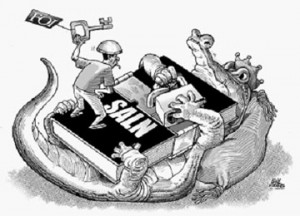
The country’s press is vibrant and free, a big plus.
But it is still hobbled by lack of clear legislation that gives life to a Constitutional mandate of transparency in government transactions.
The Center for Media Freedom and Responsibility (CMFR) circulated an online petition to support the Freedom of Information (FOI) bill that would ensure a citizen’s ready access to public documents and other government information affecting public interest.
President Aquino hasn’t delivered on his campaign promise to make this a priority of his administratin.
In the United States, an FOI Act has been instrumental in uncovering a lot of irregularities, notably the Watergate scandal that drove the late president Richard Nixon to resign.
If the FOI had been enacted into law during Gloria Arroyo’s term, one can only wonder if cases that hounded her regime such as the 2005 “Hello, Garci” scandal and the ZTE-NBN broadband deal would have been better uncovered by a vigilant press, which who along with the opposition in Congress had been blocked in every turn in their quest for the truth with Arroyo’s exercise of “executive privilege.”
When the Watergate scandal broke out, the late US president Gerald Ford wanted to strengthen the FOI Act with additional provisions but concern over privacy issues convinced him to veto the bill that was later overridden by the US Congress.
President Benigno Aquino III’s recent “sermon” to national news media notwithstanding, his administration has left it to a fickle Congress to see to the fate of an FOI bill.
We strongly doubt lawmakers in Congress, who have much to hide from prying eyes, from their pork barrel spending to legislative perks, will hasten its passage.
The bill was almost mothballed by the House of Representatives during the last Congress, if not for a persistent lobby by press freedom advocates.
Access to public documents and the full range of government transactions is needed to empower citizens, and not just journalists, to hold public officials accountable for the way they use power and purse in governing.